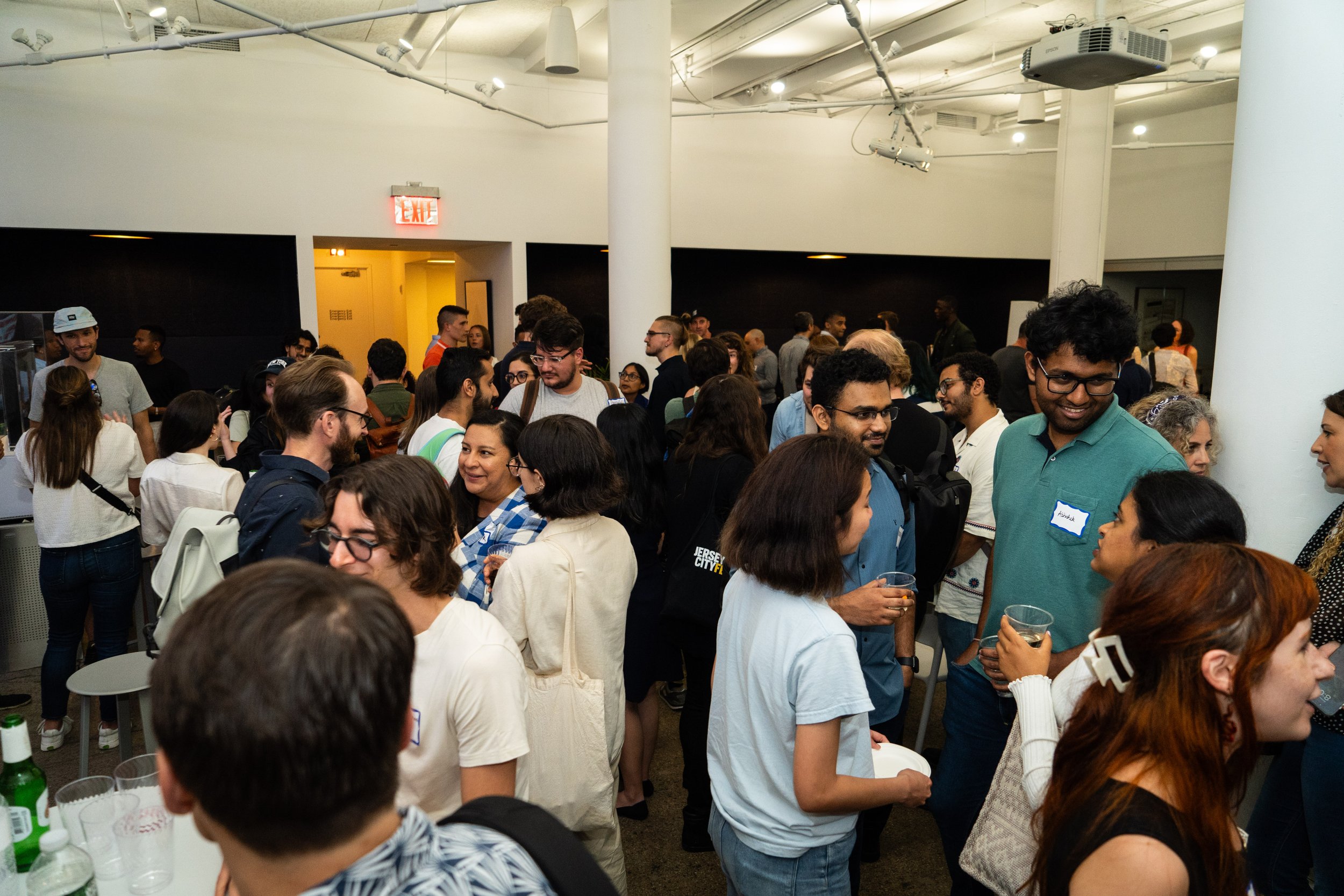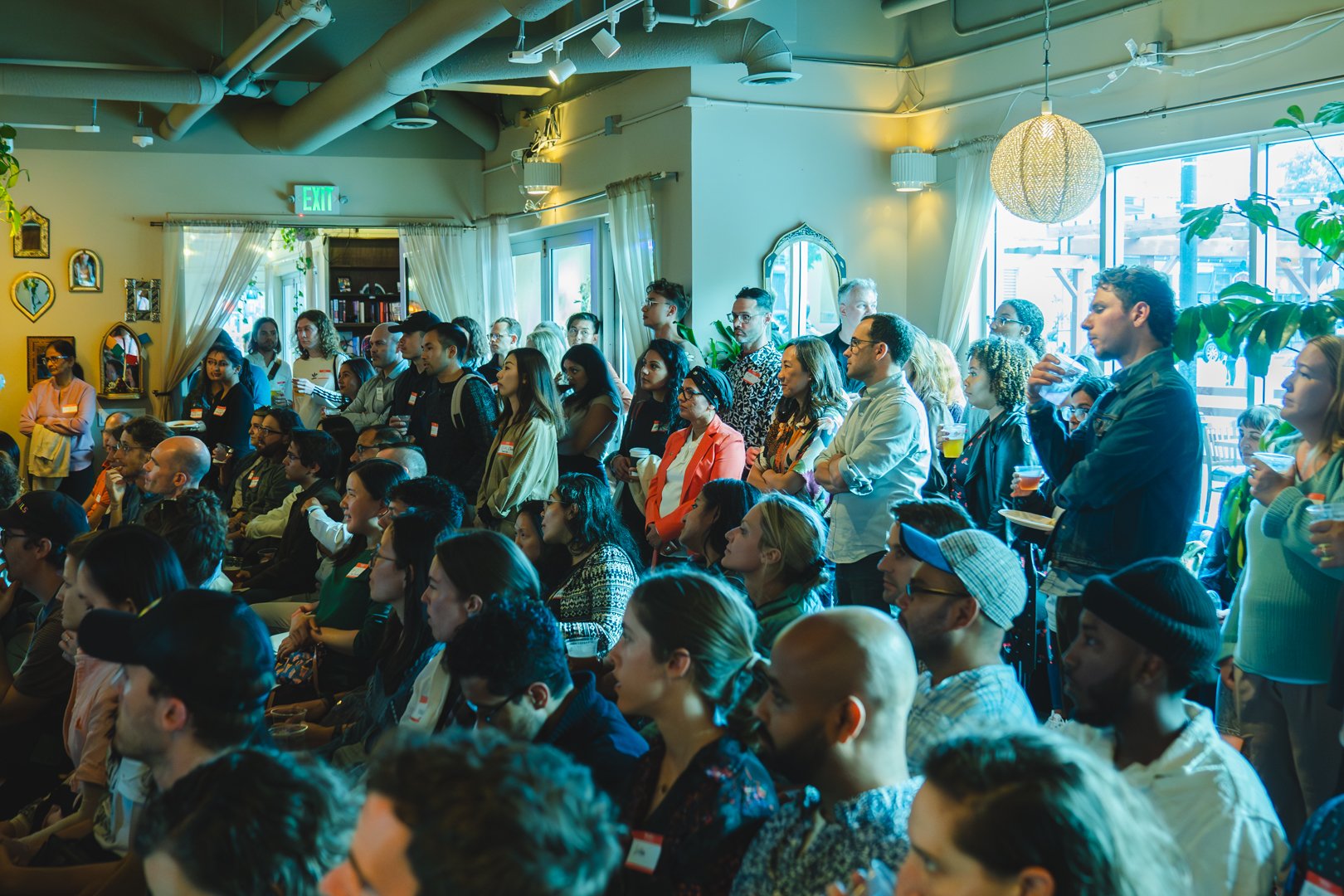The All Tech is Human Story: How Tens of Thousands of People Are Creating a Global Movement for a Better Tech Future
All Tech Is Human Director and Founder David Ryan Polgar welcomes the community to a Responsible Tech Mixer on July 26, 2023, at Betaworks in New York City.
By David Ryan Polgar, Director & Founder All Tech Is Human
“What is All Tech Is Human?” is a question I get a lot since launching the organization in 2018.
Since that time, we have grown into a global, multistakeholder, multidisciplinary network designed to tackle wicked tech & society issues while moving at the speed of tech. We recently received coverage in MIT Technology Review about our unique approach as a non-profit that is synonymous with the growing the Responsible Tech movement, so I wanted to provide insight into how we became a disruptive organization with numerous activities and programs (Slack community of 6k across 75 countries, mentorship program, talent pool, summits, mixers, working groups) that bring together tens of thousands of individuals from a wide variety of backgrounds across the globe.
Here are frequently asked questions. My aim is to provide a better understanding of the problem we are solving, how we came about, and where we are going as an organization.
What does the name All Tech Is Human mean?
Technology is not magical. It derives directly from our human decisions. The phrase is aimed at centering discourse around human agency, as opposed to the assumption that our tech future is already determined. It is the polar opposite of the pervasive techno-deterministic worldview that is found throughout the DNA of Silicon Valley. It is far too convenient to believe that technology is separate from human agency because of the illusion that tech offloads responsibility.
To me, the phrase is a distillation of our obligation as a society to collectively determine our tech future. Technology is intertwined with the future of the human condition and democracy, so it behooves us not to have a small sliver of society create a tech future without the input of our collective values and what a “better tech future” would look like. In other words, if you’re impacted by technology you should have the ability to affect how it is designed, developed, and deployed. That’s why I like to say, “No Application Without Representation.” It’s a play on “no taxation without representation,” which itself was influenced by the phrase “not about us without us.”
What does success for All Tech Is Human look like?
Not a day goes by where I am not asked about our theory of change. When I survey our current conditions, I see three major problems:
Tech innovation moves extremely quickly, while our ability as a society to understand its impact and create safeguards and rules moves painfully slow. This means that technology impacts how we get news, communicate with one another, and amend our civil liberties without adequate consent by the public. That is a major problem, and, in my opinion, the central source for societal tension right now.
Some of the most capable people who can help tackle complex tech & society issues are not part of the process. Ever since All Tech Is Human held its very first summit in October 2018 in NYC, I saw the same issue over and over again–voices that should be involved in the conversation were on the sidelines, unable to influence the larger conversation. There is a general misconception that you have to be a “tech person” in order to be involved in tech, which unfortunately is why a lot of talented individuals believe they don’t belong. They do belong. In fact, I would argue a lot of the complications we have today stem from the tech industry not diversifying the backgrounds and disciplines they hire. You can’t solve a problem if you can’t see a problem, so we need to value lived experiences and put an emphasis on backgrounds that illuminate the likely impacts of technology. In addition, contrary to popular belief, positive change happens from within industry. It happens by applying outside pressure, oversight and research, and from reimagining our tech futures. We focus on all three methods.
We don’t properly leverage collective intelligence. When All Tech Is Human started in 2018, I was perpetually surprised by how many people and organizations were effectively trying to reinvent the wheel. For example, organizations with similar objectives and workflows were siloed and didn’t benefit from critical knowledge-sharing and collaboration.
Success for All Tech Is Human means moving at the speed of tech when we consider the social impacts of technology, mobilizing thousands of new voices to be part of the process, and expanding a global network that allows us to understand values, best practices, and pathways forward.
How does All Tech Is Human accomplish these goals?
Our non-profit has a three-prong approach to change: we focus on multistakeholder convening and community-building, multidisciplinary education, and diversifying the traditional tech pipeline with more backgrounds, disciplines, and lived experiences.
We do this through our many activities that naturally weave together a broad range of backgrounds and experience levels, which allows us both to understand the Responsible Tech ecosystem and shape it in the process. Our Slack community has grown to over 6,000 members across 75 countries, more than 1,000 people have participated in our mentorship program, and thousands of individuals have been involved in our summits and mixers. Our Responsible Tech Job Board is the premiere career resource for roles in the ecosystem, and our talent pool has more than 1,600 talented individuals, and we are working with Schmidt Futures on Takalo – a free matchmaking service for social impact roles. Nearly 1,000 people have participated in our working groups that help create community reports, such as our Responsible Tech Guide.
When you look from afar, All Tech Is Human can look like a scrappy nonprofit that always punches above its weight. But when you look under the hood, you’ll see we have built a better mousetrap for solving complex tech & society issues - one quite powerful in our ability to influence our tech future.
What is your grassroots-power model?
An early aha moment I had: some of the smartest people make some of the dumbest decisions. Why is this?
Well, in my experience, there is a massive disconnect between the best ideas and those in positions of power and influence. I saw this first hand over the last decade, getting invited to speak at conferences, join working groups, and getting invited to fancy behind-the-scenes meet ups. It became crystal clear that people in insulated spaces often do not have access to the best ideas because they rely on a vetted circle of individuals. The problem is that this creates groupthink. All Tech Is Human marries the grassroots ability to understand values, problems, and best practices to traditional sources of power.
There is a common misconception that well-funded and well-known organizations have access to the greatest amount of high-quality, paradigm-shifting ideas, but in my experience I have repeatedly witnessed these legacy orgs have a major blindspot: they are structured in a way that cuts them off from actually understanding what is happening on the ground. You can’t have your ear to the ground when your head is in the clouds, and most organizations cut themselves from understanding the opinions of the general public.
Why does this happen?
A lot of people haven’t received the memo that the web upended how people want to participate in the tech conversation. The concept of traditional thought leadership is dead – and good riddance! People are not looking for guidance from a few unappointed thought leaders, they are looking to be part of the process. In other words, the top-down forms of idea dissemination is not only outdated but also offensive since it leaves out so many voices.
Although I never viewed All Tech Is Human as a disruptive organization when we launched, I soon realized our approach highlights a tension between people and organizations that rely on the status quo and those –like myself– who recognize there is a paradigm shift happening.
How is All Tech Is Human funded?
All Tech Is Human has 501c3 status through our fiscal sponsor, Hopewell Fund. Our funding has come from foundations including the Patrick J. McGovern Foundation, Ford Foundation, Schmidt Futures, Project Liberty, Susan Crown Exchange, and Pivotal Ventures. For our gatherings, we typically find a partner to allow us to pay for food, drinks, travel, photography, videography, and production. Recent gatherings have been in collaboration with Atlantic Council, Avanade, Mozilla, and Crisp, a Kroll Business.
For nonprofits in the ecosystem, funding models tend to be one of four types: receive support from major foundations, rely on individual contributions/membership dues, charge for services, or have company sponsors. There is no perfect model, and they each have their tensions and trade-offs. The reason why we have gone to traditional foundations is to focus on having an extremely low barrier to entry. This allows us to operate our programs at no cost, including our Slack community, Mentorship Program, critical career services like the Responsible Tech Job Board and Talent Matchmaking, and Mixers and Summits, among much else.
We are currently working on revenue streams to offset our reliance on large foundations, which include a match matching service for companies looking to hire in Responsible Tech. Involving thousands of people means that we have unique insight into where the movement is headed and have a large and diverse network. This is quite powerful.
Where do you see All Tech Is Human fit into the larger ecosystem?
The fancier description for how All Tech Is Human is structured is a “complex adaptive system,” a model coined and advocated by Thomas Friedman. In a recent New York Times Op-Ed describing our current challenges around the fast-moving innovation related to AI, Friedman calls this current moment our “Promethean Challenge” and describes complex adaptive systems as a design “where business, government, social entrepreneurs, educators, competing superpowers and moral philosophers all come together to define how we get the best and cushion the worst of A.I. No one player in this coalition can fix the problem alone. It requires a very different governing model from traditional left-right politics.”
In a similar vein, All Tech Is Human is a break from traditional hierarchical organizations that depend on the voices of few to speak for the wants of many. Our organization relies on collective action and understanding, which is why we are designed to involve thousands of individuals from a diverse range of backgrounds. Instead of looking for a “sage on the stage,” we are structured as the “guide on the side” that pulls in insight and best practices while building consensus around what a better tech future entails.
About David Ryan Polgar
David Ryan Polgar is a pioneering tech ethicist, Responsible Tech advocate, and expert on ways to improve social media and our information ecosystem, along with increasing the ethical considerations regarding emerging technologies. He specializes in uniting a diverse range of stakeholders in order to tackle complex tech & society issues, cultivating conducive environments for forward progress. David founded All Tech Is Human is 2018, seeing an immense need to strengthen the nascent Responsible Tech movement and ecosystem in order to tackle wicked tech & society issues and co-create a tech future aligned with the public interest.
For Collaboration, Press, and Requests Contact: Hello at AllTechIsHuman dot Org




